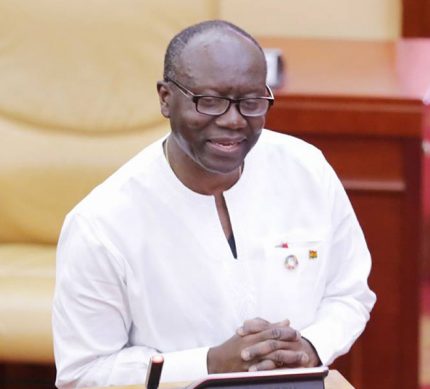The Minister of Finance, Mr Ken Ofori-Atta, has said the government will make changes in charges and fees at the ports to make them more business friendly and enhance their competitiveness in West Africa.
The review, Mr Ofori-Atta said, was expected to help promote exports and drive down the importation of foreign goods.
The finance minister, who was speaking to the Daily Graphic after the 2019 Breakfast Meeting on the governance of state-owned enterprises (SOEs) in Accra yesterday, said the country’s overdependence on imports was a disincentive for the growth of the economy.
Imported inflation
“The country’s overdependence on imports also contributes to the cedi’s depreciation,” the minister said and added: “We are going to have a comprehensive review of all our port charges and statutory fees at the ports to ensure that we have efficient and competitive ports so that we don’t import inflation from outside,” he said.
In spite of the low performance of the Ghana cedi against all the major currencies, Mr Ofori-Atta said the economic fundamentals remained strong.
He explained that the government had kept faith with making sure that the fiscal consolidation and macroeconomic stability continued.
“I think people must understand that the fundamentals are strong and we have kept faith with regard to making sure that the fiscal consolidation and the macroeconomic stability go on even against all odds and pressures,” he emphasised.
Prudent economic management
Although the economic fundamentals remain strong and the government has put in place measures that would ensure stability, Mr Ofori-Atta said the country’s overdependence on imports had to change to help consolidate the gains made from the prudent management of the economy.
“I think the buffers of the responsibility, the advisory council and all will lead to stability but for us, as an import-dependent country, that has to change because that fundamentally affects the whole issue of foreign exchange,” he said.
Consequently, Mr Ofori-Atta said the government was putting in place measures to ensure that the country reversed its dependence on imports and focused on the export market.
“We have to create a country that is export-driven so that we are not subjected to the uncertainties in the US market. That is why we will embark on this comprehensive review at the ports and also begin the full support of the one district, one factory (1D1F) and the Planting for Food and Jobs so that we can reduce our imports,” the Finance Minister said.
Local industries
On how the government was preparing local industries to reduce imports, Mr Ofori-Atta said: “The issue is structural so we are going to position our entrepreneurs to be export-oriented instead of being import-oriented and look at how we can effectively get dividends and contributions from the mining and oil companies.”
He said the recent banking reforms would also enable the government to support its industrialisation drive to reduce imports.
“One of the key issues is whether you have the natural resources or agricultural products to be able to manufacture and on top of it is whether the banking infrastructure is strong enough to provide the type of capital liquidity that is required and that is why we spent so much money (almost three per cent of Gross Domestic Product (GDP) to be able to stabilise the financial infrastructure as a framework to now begin to enhance liquidity,” he explained.
In the short term, Mr Ofori-Atta said the government would ensure that the country’s reserves were strong enough to propel investor confidence in the economy, adding that “we are confident that we have done what we should do and we expect some good results.”
Source: Graphic.com.gh







